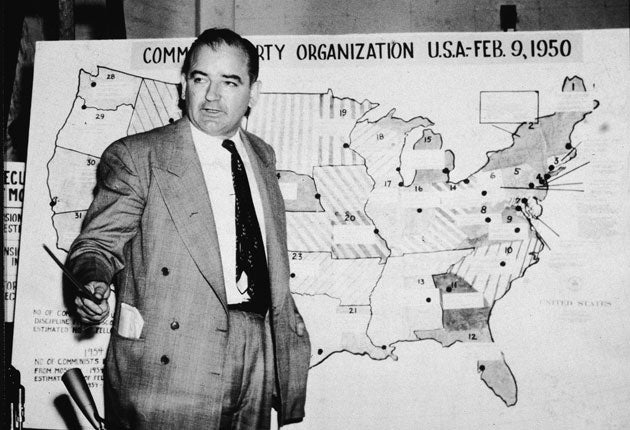Rupert Cornwell: Why 9 out of 10 Americans love statistics
Out of America: The US obsession with numbers is a symptom of the nation's desire to predict and control everything – from baseball to hurricanes

I write these words from Barnes-Jewish hospital in St Louis, Missouri, where my wife has just undergone back surgery. It is a wonderful place, as anyone who's set foot there quickly realises, reminding you how much is right – as well as wrong – with the much-criticised US health-care system. But even here, the evidence of one's eyes is not enough. There has to be a number to prove it.
And so, walking around the vast Barnes-Jewish complex, you see banners proclaiming it is on the medical honour roll drawn up by the magazine US News and World Report, which ranks the hospital the eighth best overall in America. As for the children's hospital here, a sign outside proclaims that it is number five on a list of such establishments, according to Parents. Value judgements like mine are one thing. For Americans however, verity lies in a number – or rather, in the greatest number of numbers.
One constant about visiting a relative recovering from a major operation is that you spend a good deal of time sitting around. So I spent quality sitting-around time this last week reading a entertaining new book called Proofiness, all the more enjoyable because it confirms my long-held suspicions about this country's obsession with numbers, and how easy it is to dupe a nation with a few artfully chosen ones.
Proofiness is a coinage of the author, a New York University professor called Charles Seife who defines the term as "the art of using bogus mathematical arguments to prove something that you know in your heart is true – even when it's not."
Not, I should say, that the numbers attached to Barnes-Jewish hospital are a case of "proofiness", nor many others of the myriad numbers that form a background hum in US life, and provide endless food for the country's media. They merely pander to two American convictions: that knowledge expressed in figures is as precise and exact as the figures themselves, and that no issue is so subjective or complicated that it cannot be resolved by numbers. Many are the differences between Europeans and Americans. Not least of them, I would venture, is how the former place their faith in a pyschological truth, while for the latter, what counts is the statistical truth.
Nowhere else on earth are you subjected to bombardment by surveys and numbers as in the US. Turn on the local news station, and you will be informed of some new study showing that you are 23 per cent (note, not 24 or 27 per cent) more likely to die of heart disease before you are 75 if you don't eat vegetable X three times a week.
Forecasts are another example. No matter if they are absolutely useless. They too suggest that all things are predictable in figures, and thus controllable. Each year, for instance, various meteorological institutes publish estimates for the coming Atlantic hurricane season, complete with the number of storms, how many will become hurricanes and major hurricanes, and how many will hit the US mainland. The exercise is pointless. Often the predictions are spectacularly wrong. Even when (like this year) the guesses aren't too far off the mark, they cannot say where or when the hurricanes will hit – indeed whether they will make landfall at all. So why bother? Because, I suspect, they are comforting, suggesting that even the most capricious and destructive forces of nature can be tamed by numbers.
Or take that especially subjective and tricky of judgements, on the relative merits of different wines. No problem. Comfort is to be found in the ratings on a 100-point scale by the wine critic Robert Parker. If the 2007 merlot from the Plonque Abominable estate in Napa Valley gets a 92, you may set any doubt aside.
And numbers explain why soccer, as they call it here, will never conquer American hearts. The most popular US sports are statistically sliced and diced every way, every day. In baseball, the most number-swamped of them all, each year brings a new mathematical formula to unlock the game's mysteries.
Alas, soccer has proved impossible to reduce to numbers. Sure, the Americans are trying. This year's World Cup drew a blizzard of statistics, from the number of assists to pass-completion rates and total passes by individual players. But to no avail. Soccer provides psychological truth. But there's only so much number-crunching you can do with a 0-0 draw, followed by a penalty shoot-out.
All this, though, is harmless fun. Not so other examples of "proofiness" cited by Mr Seife. Probably, Senator Joe McCarthy takes the biscuit, with the list of 205 alleged Communists working at the State Department he brandished during a speech in 1950.
The list was rubbish. But what gave it credence was not a widespread suspicion that the country's government was infested by reds – but that there were precisely 205 reds. No matter that the figure was subsequently raised to 207, and then slashed to 57. The figure itself made it seem true. Phony maths also polluted the 2000 election in Florida. The true outcome was unknowable, with variables far exceeding the bare 537 votes by which George W Bush was adjudged the winner over Al Gore. The only fair result was a tie, that should have been settled by the toss of a coin. But in America, numbers, even polluted numbers, are sacred. So I shall take even greater solace, now I know my wife is being treated in the eighth best hospital in all the USA.
Join our commenting forum
Join thought-provoking conversations, follow other Independent readers and see their replies
Comments